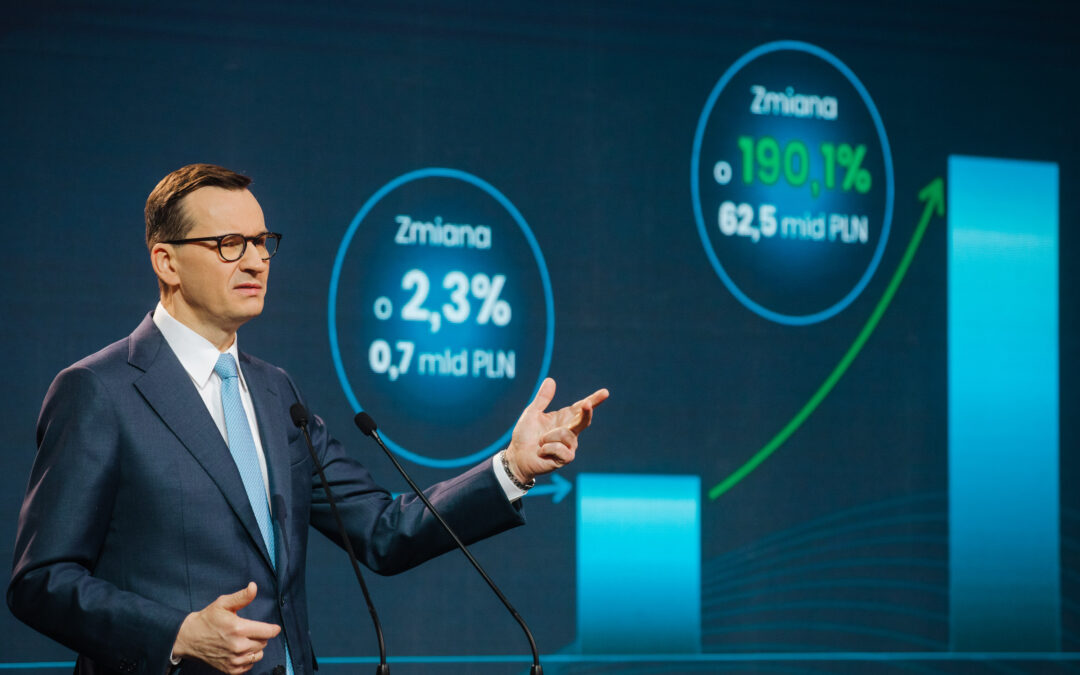Poland’s deficit for 2022 came in almost 60% lower than planned in the annual budget, despite the effects of the COVID-19 pandemic, the outbreak of war in neighbouring Ukraine, and the influx of millions of refugees.
“We have survived the plagues of Egypt,” declared Prime Minister Mateusz Morawiecki during a speech on Monday. “Three years ago the world was hit by a coronavirus pandemic, and more recently the world was destabilised by Russian aggression against Ukraine.”
“Our budget deficit [for 2022] was predicted to be around 30 billion zloty,” he noted. “Meanwhile, I can announce that the deficit for 2022 is 12.4 billion zloty.” That put the general government deficit, a measure closely monitored by the European Commission, at around 3% of gross domestic product (GDP), added Morawiecki.
Największym ślepcem jest ten, kto nie chce widzieć. Liczby nie kłamią.
Po latach nieudolnego zarządzania wyprowadziliśmy finanse publiczne na prostą. Mimo pandemii. Mimo wojny.#StabilneFinansePubliczne pic.twitter.com/vTDl5naEWX
— Mateusz Morawiecki (@MorawieckiM) March 6, 2023
The national budget for 2022, adopted by parliament in December 2021, assumed state revenues of 491.9 billion zloty (€104.7 billion) and expenditures of 521.8 billion zloty (€111.0 billion), meaning a deficit of just under 30 billion zloty (€6.4 billion).
In early 2022, however, the government faced unforeseen challenges prompted by Russia’s full-scale invasion of Ukraine, which helped bring inflation to a 25-year-high of over 17% and led to millions of refugees crossing into Poland.
To alleviate inflationary pressures, the Polish government introduced, among other measures, a reduction in value-added tax (VAT) on all basic food products to zero and a reduction in VAT on fuel, gas, heat and electricity, and excise duties. It was a “huge loss to public finances,” said Morawiecki today.
After slowing down for the last two months, annual inflation accelerated again in January to reach 17.2%. That was, however, below forecasts of 17.6%.
Economists expect inflation – which is at a 25-year high – to reach its peak this month before slowing down again pic.twitter.com/hS1dCeMhjs
— Notes from Poland 🇵🇱 (@notesfrompoland) February 15, 2023
After today’s speech by the prime minister, the finance ministry reported that budget income in 2022 had amounted to 505.0 billion zloty while expenditures was at 517.4 billion
Morawiecki cited the government’s efforts to improve tax collection as being part of the reason for the healthier-than-expected budget. In 2022, VAT revenues were 6.8% higher than the previous year and CIT revenues 33.9% higher.
“Large multinationals were taking taxes outside our borders – that is why we have embarked on a major overhaul of the entire system,” said the prime minister.
Poland recorded the EU's joint second-largest improvement in VAT collection between 2016 and 2020.
Over that period its VAT gap – the difference between expected and collected revenue – fell by 9.1 percentage points amid a clampdown on fraud and evasion https://t.co/ckuy4WMgQF
— Notes from Poland 🇵🇱 (@notesfrompoland) December 12, 2022
Many experts, however, have warned that the government has increasingly taken some spending outside the official budget, so the real deficit may be higher. In 2021, the state audit office, NIK, found that the government used “unprecedented mechanisms” to spend more than rules on public debt allow.
Sławomir Dudek, head and chief economist of the Institute of Public Finance (IFP), who has in the past repeatedly pointed to the lack of transparency in the Polish budget, believes that that the deficit for 2023, set by the government to be at 68 billion zloty, could be understated by as much as 167 billion zloty.
“Neither a pandemic nor a war justifies the destruction of the constitutional importance of the state budget, taking huge amounts of public spending out of public oversight, and using creative accounting tricks to lower the budget deficit and circumvent the budgetary rules,” he wrote today in an appeal to the state authorities.
Od kilku lat obecny rząd stosuje bezprecedensowe tricki mające na celu zaniżanie deficytu "budżetu państwa". Jak wyliczylismy w 2023 "prawdziwy" deficyt jest 3,5 razy większy👇
Bieżące wykonanie +11,2 mld zł to FIKCJA. Niech rząd ujawni wszystkie dane.
#patobudżet https://t.co/jXOxskB3w7 pic.twitter.com/4aJkqXhMx8
— Sławomir Dudek (@DudSlaw) March 1, 2023
Main photo credit: Kancelaria Premiera / flickr.com (under CC BY-NC-ND 2.0)

Alicja Ptak is deputy editor-in-chief of Notes from Poland and a multimedia journalist. She has written for Clean Energy Wire and The Times, and she hosts her own podcast, The Warsaw Wire, on Poland’s economy and energy sector. She previously worked for Reuters.




















